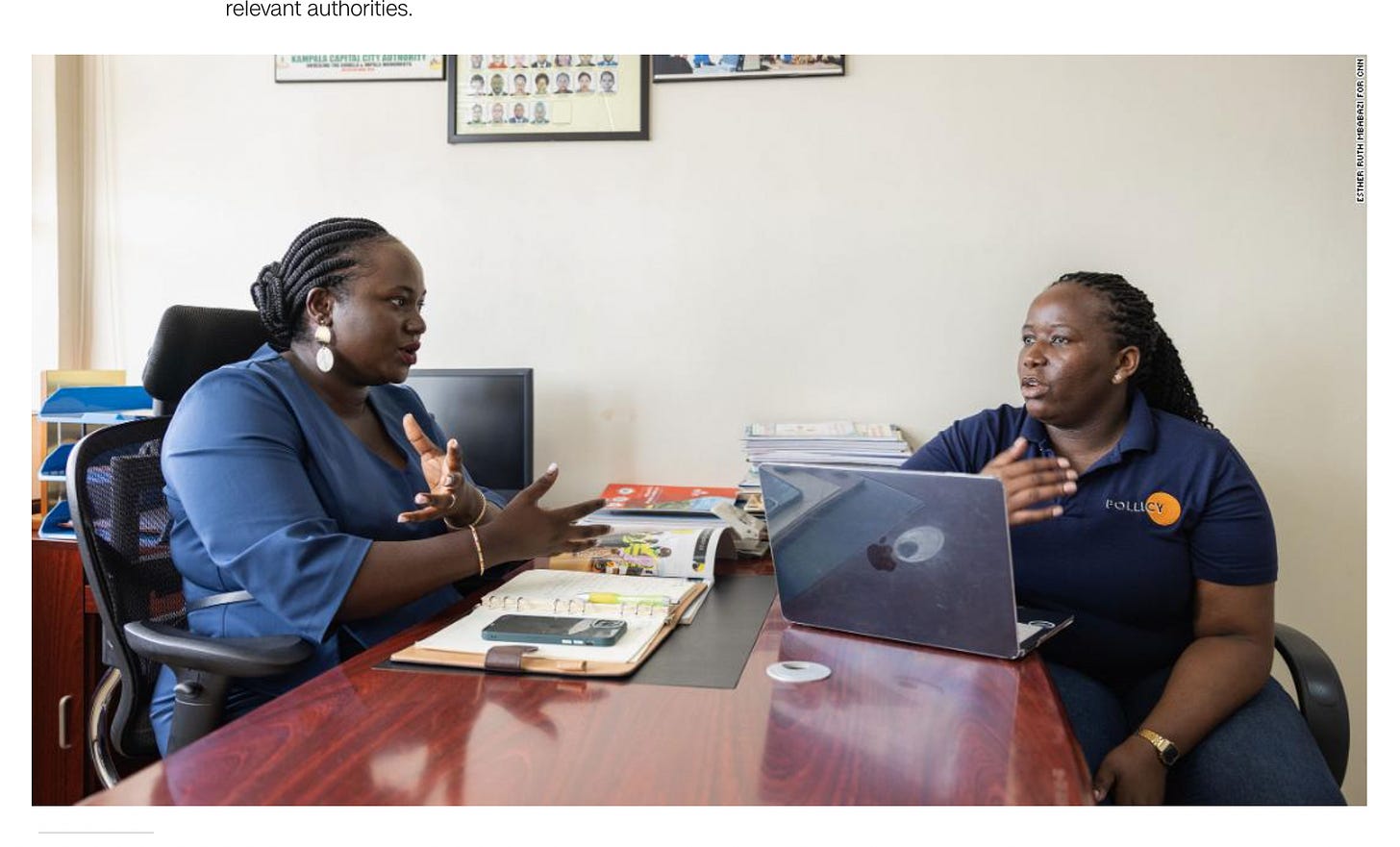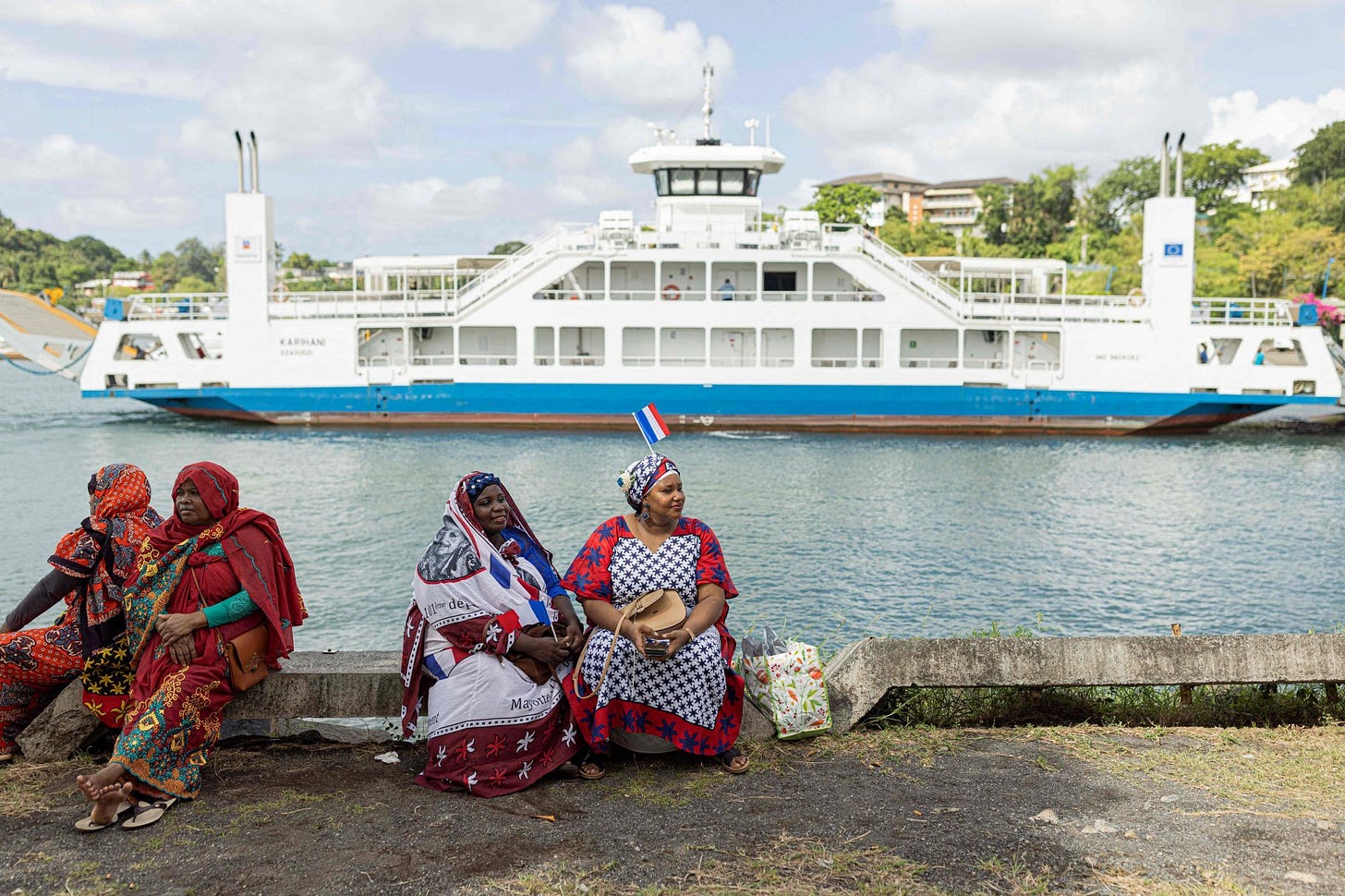Global Roundup: Uganda Women Politicians, Migrant Women in Europe, Hong Kong LGBTQ+ Couples, Queer Intimacy Photo Series, Tunisian Digital Artist
Curated by FG Contributor Samiha Hossain
Olive Namazzi, Local Council V Representative for Kampala, interacting with Irene Mwenda, Director of Strategic Initiatives at Pollicy, at the City Hall offices in Kampala, Uganda.
Women politicians in Uganda face a torrent of online abuse yet continue to do the work.
Doreen Nyanjura is a modern politician. She announced on Twitter that she would be standing in Uganda's 2026 presidential election; calls her supporters the Nyanjuraholics and has characterized her platform with a catchy hashtag: #ThePoliticalAntidote. However, in addition to the tweets of support or derision that most politicians on social media have become accustomed to, Nyanjura also receives tweets of misogynistic mockery. The personal attacks cover everything from the length of her hair to her age and marital status. She says that the harassment she gets on social media and messaging platforms is worse when she advocates for gender equality.
Many feel advocating for equity and equality is an abuse of culture and religious beliefs. For all my posts advocating for gender equity, I receive abuse or insults. -Doreen Nyanjura
When Olive Namazzi decided to go into politics, she believed she would have a rewarding public life. But Namazzi says she hadn't realized that stepping into the political arena as a woman – and one with a disability – would kick off a campaign of cyberbullying that would last for more than a decade.
Recent surveys in Uganda have revealed stark numbers highlighting how common it is for women to be targeted online. The research, led by the feminist tech collective Pollicy in 2020, found that one in three women between the ages of 18 and 65 surveyed in Uganda said they have experienced gender-based online violence. A 2021 study found that this increased among women leaders and high-profile women, with 50% experiencing trolling.
This online abuse of women politicians is happening in a country that has had a cybersecurity law in place for more than a decade. However, experts and human rights organizations have long raised concerns that rather than protect populations vulnerable from trolling and harassment, such as women in politics, its vague terminology can lead instead to the law being used to silence activists or opponents of the government. Legal and women's right's experts say that the challenges with using the law to successfully prosecute online harassment results in women deciding not to report abuses to the relevant authorities.
With laws failing to protect women, civil society organizations like Pollicy have spent years creating national and regional programs to help women protect themselves online. One team at Pollicy created a digital game, Digital safe-tea, in which you enter the lives of three fictional women to learn about the digital threats they face on a regular basis, including "Zoom bombing" (intrusion of a zoom call by a troll), impersonation and sexually explicit imagery shared without consent. The game helped Namazzi learn how to respond to her bullies.
I almost ran mad engaging a bully for two days nonstop. But I was determined to be a politician against the odds of any kind of intimidation...Rather than cower to the bullying, I have chosen to stay on and attack them right back. -Olive Namazzi
Migrant women on the French island of Mayotte have settled in slums and the government wants to demolish their makeshift housing. Photo: AFP
If you cross the Mediterranean, it’s because you had a problem back home. That could be a rape, genital mutilation or a forced marriage, enough reason to leave your country. -20-year old woman from Ivory Coast
More than 45,000 migrants have landed in Italy since the start of the year, according to the interior ministry, nearly four times as many as in the same period a year earlier. Many then try to cross the French border between Ventimiglia and Menton, in France’s southeast, sometimes hoping to travel on to other countries. But the French authorities are sending more back. Many of the women waiting have young children with them. Some are pregnant, but may not know it yet.
Marina Castellano, a 60-year-old nurse at the Medecins Sans Frontieres (MSF) clinic says the team noticed shortcomings in the way that they look after the women. Language and cultural barriers often complicate their job, calling for new approaches. Alessia Alberani, a 26-year-old Italian midwife, knitted dolls with visible genitals to help with sensitive conversations about health issues concerning the vagina, the uterus or breasts.
Women who came through Tunisia or Algeria have often been targets of sexual assault or assault on their health. Some never got proper care when giving birth in hospitals, and there are many problems with genital infections. -Cecilia Momi, MSF official
It is important to shed light on the struggles of migrant women as there are several gendered effects of displacements.
Photo credit: Getty
Leia and Zhen (not their real names) are both teachers at a Christian school and a couple. Because of their work, Leia and Zhen have to be discreet about the true nature of their relationship. While they can’t be open at work, they say that things are getting better in Hong Kong for queer people. Neither of them harbours particularly romantic notions about marriage – they see it more as a human right that would give them added security in life.
The younger generation is starting to accept same-sex relationships – they’re more open-minded than the older generation. If our students knew we [are] together, they would be thrilled and excited for us, but this won’t be the school’s perspective. -Leia
Professor Holning Lau is one of the researchers who worked on a recent survey that showed support for same-sex marriage is on the rise. The research isn’t entirely clear about the reasons for the dramatic change of heart among Hong Kongers over the past decade, but Lau thinks it could be to do with increased media representation of LGBTQ+ couples, a series of significant court rulings on LGBTQ+ rights and the number of other countries around the world that have legalised same-sex marriage. For instance, there have been a number of cases in Hong Kong’s lower courts since 2020 that have reaffirmed same-sex couples’ rights in housing, inheritance and regarding the custody of children.
Still, Hong Kong’s government remains opposed to any progress on same-sex unions. In 2018, the government fought a lawsuit from a woman who argued that her right to privacy and equality had been violated because she wasn’t allowed to enter into a civil partnership. The High Court eventually dismissed the case in 2019, saying the issue of same-sex unions was “beyond the proper scope of the functions or powers of the court”. There’s still a lot of opposition, but Hong Kong’s LGBTQ+ community now knows that change is on the horizon and believe same-sex marriage will eventually come to their shores.
Delhi-based writer-photographer and intimacy coordinator Raqeeb is capturing queer intimacy in its rawest and purest form. Raqeeb, 29, who grew up in Kolkata, started the page @daintystrangerphotos in 2018 as a space to share his journey with his body and images of his ex-lover. Over time, the page grew into something much bigger than Raqeeb had envisioned. Today, he’s helped build a community of people who share similar stories of insecurity and un-belongingness in relation to their bodies.
Growing up in the late 90s and early 2000s, I didn’t see many representations of queer intimacy or vulnerability in the mainstream. -Raqeeb
Raqeeb says that he was confused about his own sexuality for the longest time and had similar images existed in the mainstream, he might have had a less difficult journey. In the ongoing series A Day with the Lovers, Raqeeb spends 24 hours with a couple to document their intimacies, joys, and “everything that encompasses a relationship,” including, he said, the tiniest details that make their love endure. The motivation for the photo series is the societal ethos of hushing anything that is “uncomfortable” to talk about.
The series began due to my own obsession [with] love. I find love to be an all-encompassing phenomenon, something that can make anything better, something that brings joy and liberation, but also sorrow and separation. It is the yin-yang in my life, and that perfect balance is what we’re all trying to find. -Raqeeb
Raqueeb tries to feature everyday people in the series. He shares the stories behind some of the photos he’s made of couples. He discusses relating to their struggles, finding friendship and building close relationships he never would’ve imagined.
An artist in Tunisia, Olfa Dabbabi, promotes women’s rights through her digital portraits. Her exhibition, titled ‘V like a Venus’ highlights the aesthetic and moral dimensions of womanhood. Her art uses vibrant colours and portrays a range of women.
The thing I always wanted to do was to represent women in an artistic way. I always want to present their bright, brilliant, beautiful traits and for them to always be in a position of strength and this is the message that I want to deliver through my art. -Olfa Dabbabi
One woman who attended the exhibition expressed her appreciation for Dabbabi’s work.
…Through her art, she portrays women in an imaginative way. When I see any of the paintings, I want to be in the shoes of the woman portrayed. So her message is great. -Wala Kasmi
Dabbabi hopes to inspire others to pursue their dreams and embrace differences.
Dissimilarity is a beautiful thing, because I see it as richness and uniqueness for each person, and this differentiation is what motivates you to create more and produce something more beautiful. -Olfa Dabbabi
Samiha Hossain (she/her) is a student at the University of Ottawa. She has experience working with survivors of sexual violence in her community, as well as conducting research on gender-based violence. A lot of her time is spent learning about and critically engaging with intersectional feminism, transformative justice and disability justice.
Samiha firmly believes in the power of connecting with people and listening to their stories to create solidarity and heal as a community. She refuses to let anyone thwart her imagination when it comes to envisioning a radically different future full of care webs, nurturance and collective liberation.






